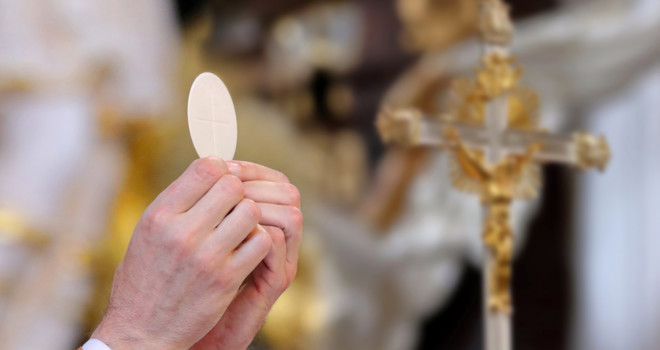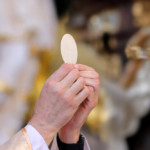How to Receive Christ With Love in the Eucharist
In Holy Communion, we touch and taste our Lord and our God. A very significant sentence of St. Augustine, in which he records Christ’s words to him, defines the chief effect of eating the Bread of Angels: “Thou shalt not change me into thine own substance, as thou changest the food of thy flesh, but […]



In Holy Communion, we touch and taste our Lord and our God. A very significant sentence of St. Augustine, in which he records Christ’s words to him, defines the chief effect of eating the Bread of Angels: “Thou shalt not change me into thine own substance, as thou changest the food of thy flesh, but thou shalt be changed into mine.” There is not, and there never can be, a closer union.
The reality of Christ’s Presence is a fact founded on His infallible word and almighty power. But bewildering is our perplexity when we try to ascertain the mode of His eucharistic indwelling. The nearer He approaches to us, the more incomprehensible He becomes; the greater our effort to understand, the more profound our obscurity. When our minds strive to progress beyond the limits marked by faith, they are baffled and confounded. The divine brilliance of light surrounding our guest impairs the soul’s vision.
As their Creator, God abides in creatures. Man cannot be independent of God. For the creature to attain both his natural and supernatural ends, the Creator must dwell in him. Even irrational creatures fall under this essential law of creation. God is everywhere: by His being or essence, because He is the cause of all being, all existence; and by His knowledge, because “all things are naked and open to His eyes”; by His power, because all things are subject to Him. “In Him we live, and move, and have our being.”
But the Incarnation inaugurates an entirely new mode of the Divine Presence. Through this mystery, man becomes one body with Christ in the embrace of a common nature. Holy Scripture beautifully unfolds the eternal import of this prodigy of divine love: “God so loved the world as to give His only-begotten Son; that whosoever believeth in Him may not perish, but may have life everlasting. For God sent not His Son into the world to judge the world, but that the world may be saved by Him.” “This is eternal life: that they may know Thee, the only true God, and Jesus Christ, whom Thou hast sent.”
In this wholly new manner of the Divine Presence, how low Christ descends to exalt the creature! St. Paul’s words to the Philippians on this subject are sublime in their simplicity: “Let this mind be in you, which was also in Christ Jesus: who being in the form of God, thought it not robbery to be equal with God: but emptied Himself, taking the form of a servant, being made in the likeness of men, and in habit found as a man. He humbled Himself, becoming obedient unto death, even to the death of the Cross.”
As an earthly king, realizing that he is God’s representative, and having at heart therefore the dearest interests of all — but especially of the poorest of subjects — as such a one conceals his royal raiment beneath attire as shabby as theirs, in order to be more accessible as he distributes his gifts to them, so the King of kings wraps in fallen nature the eternal glory of His divinity, to raise man in new bonds of love to a higher life, to give him the gift greater than which God Himself cannot give.
So, too, the words of Christ: “If anyone love me, he will keep my word, and my Father will love him, and we will come to him, and will make our abode with him” put the soul into a relationship with God far closer than that by which the Creator is everywhere in His creation. God dwells in man in a special way, it is true, because man, being rational, is the only creature who can know and love the Creator. But the Divine Presence connoted by the Incarnation differs essentially from its consequences. In this instance, Christ is the almsgiver of Heaven’s largess, revealing Himself under conditions entirely new, and in a manner that, until the fullness of time had come, could not be realized.
By this mystery, man’s sin was forgiven, the supernatural life of his soul restored, and his nature justified and elevated to the most loving companionship with God. The creature was endowed with the capacity for growth into the likeness of his Savior so that, by the acquisition of His virtues, the mind that is in Christ should also be the mind that is in him.
But even beyond the restoration of man’s nature to its primal supernatural righteousness, and his ability to reproduce the virtues of Christ in his soul, there is, through the Incarnation, the living consciousness of the union between God and man, and the joy accruing to the creature from the personal love of Christ, dwelling in such close intimacy with him. This is the crowning glory of this preeminent mystery — just as the harmonious blending of colors, producing the most delicate tints and finest shades, completes over and above the rough outlines, the masterpiece of the artist.
All these marvels coalesce in the Holy Eucharist. This sacrament was instituted to confer on us, not merely particular graces, but all the gifts of the life of the incarnate God as well. Never has God revealed Himself with such energizing fullness. Such a revelation does not, however, contravene the bestowal of a definite grace in answer to a special request. Christ can manifest Himself to us in the manner best suited to our spiritual development because He is the infinite archetype of all the forms of holiness; the source of sanctity in all the varied expositions of its comprehensive unity.
Reflection on these stirring truths will impel us to receive Him with a love that will satisfy His yearning to be one with us. He must be one with us in order that, sharing His eucharistic life, and profiting by its treasures, our weak, changeable nature may be transformed and our faculties supernaturalized, and we may be fashioned into His likeness.
What Christ by His sacramental presence does in us, we should do in the world around us. As He transfigures us with His grace, we, too, must elevate and ennoble all who come within the sphere of our influence. We fall short of the divine purpose in the institution of the Holy Eucharist if we fail to dispense the beneficent effects of the Life of all life. Conscious of the marvelous expansion of its power, we will do everything we can to requite the love of Christ for us by always being His representatives in the world’s wilderness of sin.
This thought, that we must be other Christs, should inspire our words and actions. Briefly, we must glorify Christ by emptying ourselves for others, as He glorifies the Father by emptying Himself for us. What a mission of purest love would be ours if we daily endeavored to kindle in the souls of our brethren the fire of love which our Savior came to cast on earth, and longed so ardently to see kindled!
How else can we make possible the eucharistic life of our Lord and Master in our own souls? Christ came to restore to His Father the souls of sinners. Only by continuing this work, only by love of our neighbor, will we be saved, for our sacrifices, and the helpfulness of our charity for others, will decide our eternal destiny.
“‘Come, ye blessed of my Father, possess you the kingdom prepared for you from the foundation of the world. For I was hungry, and you gave me to eat; I was thirsty, and you gave me to drink; I was a stranger, and you took me in; naked, and you covered me; sick, and you visited me: I was in prison, and you came to me.’ Then shall the just answer Him, saying: ‘Lord, when did we see Thee hungry and fed Thee; thirsty and gave Thee drink? And when did we see Thee a stranger and took Thee in? Or naked and covered Thee? Or when did we see Thee sick or in prison and came to Thee?’ And the King answering, shall say to them: ‘Amen I say to you, as long as you did it to one of these my least brethren, you did it to me.’ ” The doom of the faithless will be ours if the eucharistic life ends only in selfish possession.
Our expression of responsive love and gratitude after each Holy Communion should be to glorify the sacramental Savior by the revelation in all our dealings with others of the effect of our union with Him.
✠
This article is from a chapter in Transforming Your Life Through the Eucharist, available from Sophia Institute Press.














